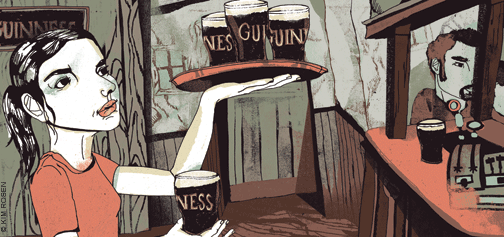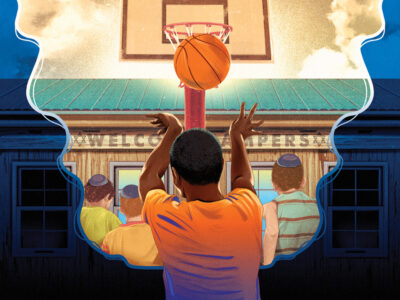
“I longed to lose myself in the waitressing world again.”
By Rachel Friedman | I’m more graceful as a waitress than I am in real life. I can wrangle three full pitchers with one hand and balance two plates on the other. I can deftly uncork a wine bottle while memorizing a complicated order. I can twirl expertly around a co-worker at just the right second to avoid a collision. I love the transient atmosphere of restaurants and bars, packed with creative types, each person positive that he or she is only there temporarily—a fleeting stop on the way to something better. Waitressing was always my go-to job growing up. I started at a Ruby Tuesday’s on a depressing strip of eateries in my hometown, then moved on to a micro-brewery in Boston, where I found myself flush with $200 a night in tips. Later, when I was at Penn, I served pints in Center City at a friendly little Irish pub where photographs of dead poets lined the greasy walls. The male bartenders were all bona fide Irishmen and I had a minor love affair with their accents during my time there. “Say thanks,” I’d request, just to hear how charming the word sounded with no h in it. Really, they could have said anything at all.
Those lilting voices, plus all the Joyce I plowed through junior year, might be partly why I found myself in Ireland the summer before my senior year, but surely the main reason was because I was running away. My role as a student had very clear expectations, expectations I had proven I could meet. Out in the world, though, I wasn’t so sure of myself, and the fact that very soon life would no longer be a series of exams to conquer and summer breaks to languish in was terrifying. Ireland seemed like as a good a place as any to flee the many decisions I was expected to make about my post-graduation existence. So I went to Galway, took up residence in a cheap hostel, and set about hunting for pub work.
At the end of my first week, I’d heard “Come back in a week” or “Try next door” from dozens of indifferent bartenders. Ten days in, with no job and quickly diminishing funds, I was considering defeat, wondering if maybe the whole idea of coming to Ireland alone with no plan and only $400 was a mistake.
That afternoon I wandered into a dingy little pub off the main drag, feeling sorry for myself. It was deserted except for an old guy in a red Patriots cap chatting away to a nodding young bartender drying pint glasses. A few seats down a middle-aged man with puffy red hair sat hunched over some documents. He turned out to be the manager, Brian. When he, like so many before, informed me that they weren’t hiring, I found myself embarrassingly on the verge of tears. My soggy clothes and matted hair, and sneakers so soaked they squished from pavement pounding in the rain, must only have made me look even more pathetic.
“Please,” I begged. “I’ll do anything.”
His eyes were friendly but I didn’t think I had a shot in hell.
“Where are you from?”
“New York,” I sighed, unsure whether I was strengthening or dooming my case.
“New York!” Suddenly he was animated. “Ahh, New York is brilliant. Right, I’ll tell you what. I’ll give you a trial shift—just because you’re a New Yorker—and we’ll see how it goes. Come back tomorrow night and we’ll put you on glasses.”
I had no idea what it meant to be “on glasses,” or what I’d get paid for this mysterious position, or even how long I’d work, but I didn’t want to give Brian enough time to change his mind or realize I’m from the cows-and-pastures part of New York, not the bright-lights part he was clearly conjuring.
“Thank you thank you thank you!” I shouted, backing out the door. In my excitement I enthusiastically saluted him, though I have never saluted anyone in my life, no doubt leaving him with the impression that he had just made a very big mistake.
Being a good waitress is a skill I’ve always felt guilty about because it is blue-collar, non-intellectual work. My grandfather did not flee the Nazis so that I could serve people food. My mother didn’t climb out of poverty so that I could revel in my ability to concoct the perfect apple martini. The fact that I was going to be a Penn grad soon made my parents question the wisdom of working in a pub right before my senior year, instead of say, interning somewhere that would look good on my resume. But although I knew they wished I was doing something more productive with my Irish summer, I longed to lose myself in the waitressing world again.
And the dimly lit, time-forgotten Hole in Wall seemed like the perfect place to do just that. The pub’s original rock walls had been plastered over and they resembled clotted cream. There was dark paneling everywhere, chipped wooden tables, and tiny windows with crisscross frames set deep into the walls like a fairytale cottage, perfect for when we pulled down the shades for a lock down—where we’d hunker inside and drink until the sun came up. The entire place had a fantastic slope to it. Walking into the back room was an expedition aided only by the low lights of old-fashioned gas lamps. The owner had hung pictures of himself with a multitude of winning horses taken during the yearly Galway Races, when the pub practically exploded with thirsty bodies. There was Guinness paraphernalia everywhere.
“On glasses” turned out to be collecting the dirty glasses from around the pub and returning them to the bartenders to load in the tiny dishwasher. The Hole in the Wall was packed with boisterous students almost every night. I pushed through overheated bodies to get at the stacked glasses that lined every available shelf and threatened to topple off the rickety tables in the front room where a few lucky groups managed to score seats. I worked for four or five hours at a stretch, sweaty and claustrophobic, but elated to be employed.
After four trial shifts as a “glassie,” I convinced Brian to let me train on bar. I was still cash-strapped and my Spanish roommate was constantly lending me rent money. It didn’t help my financial situation that my days soon become one long stint at the Hole in the Wall. I’d bartend three or four or, if I was lucky, five nights a week, and then end up drinking there once my shift ended. After midnight my Irish girlfriends and I would spill into the clubs, dancing more than I have ever before or since, buzzing from vodka and Red Bull. I’d sleep until noon then meet the girls for “the cure”—the Irish method of banishing your hangover with more drinking.
Everyone around me was in their early twenties. No one had anywhere to be, so we stayed at the bar, drank cheap beer, and played old Irish love songs on the jukebox. There seemed no limit to our days together. I’d never had so many friends at once, and whom I’d liked so well, as I did in this town where I initially felt so lonely and knew not a soul.
Maybe I’ve always liked working in restaurants and bars because I am the kind of person who is perpetually trapped inside the recesses of her own mind—fretting and analyzing and worrying—and waiting tables is blissfully routine and physical. It’s a task with a clear beginning, middle, and end. Take their beverage order, bring their drinks, take their meal order, bring their food, check in, get them the extra pickles, another round of beers, dessert, and then drop off the bill with a heartfelt thanks. Then those customers depart and new ones shuffle in and you have to figure out what they want, and how. Do they want a funny waitress, a serious and knowledgeable one, or one who just leaves them the hell alone? Most just want an unobtrusive, smiling one. I can smile, or not. Knowing who they want you to be is simple. You don’t have to guess; you just have to observe.
One night in early August, near the end of my endless Galway days, my friend Eileen announced: “It’s official, chicken. You’re Irish.” I surged with pride, like I had passed a particularly difficult exam. It was exciting to fit somewhere after feeling so overwhelmed and confused for so many months. It didn’t occur to me then that this was simply my friend’s way of expressing affection—that she didn’t wish me to be anyone but myself. Yet in Ireland, I had become someone entirely different: a wild girl who stayed out late, guzzled Guinness, told coarse jokes, and said yes to every invitation. I wasn’t going to be that girl forever, I knew, just like I wasn’t going to wait tables forever, but I liked the parts of myself that I discovered in both places. That summer waitressing in Ireland, I existed wholly in the present moment, maybe for the first time in my life. I had no past or future, which suited me perfectly, since, at that particular moment, I did not wish to reckon with either.
Rachel Friedman C’03 G’07 lives in Manhattan. This essay is adapted from her forthcoming travel memoir, The Good Girl’s Guide to Getting Lost: A Memoir of Three Continents, Two Friends, and One Unexpected Adventure.




